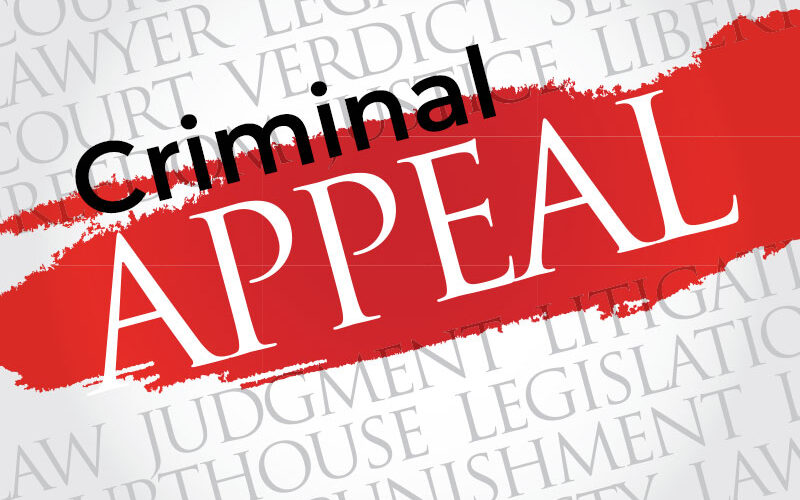What are criminal appeals?
Criminal appeals refer to the process in which a defendant in a criminal case seeks to have a higher court review a decision made by a lower court. The purpose of a criminal appeal is to challenge the legality or fairness of a trial court’s decision and to seek a remedy such as a new trial, a reduction in sentence, or an acquittal.
Criminal appeals can be filed for a variety of reasons, including:
Errors in the trial process: These are mistakes made during the trial that may have affected the outcome of the case. Examples include the admission of evidence that should have been excluded, the exclusion of evidence that should have been admitted, or errors in jury instructions.
Ineffective assistance of counsel: This occurs when the defendant’s lawyer failed to provide competent representation, which resulted in a violation of the defendant’s rights.
Misconduct by the prosecution or trial judge: This includes situations where the prosecutor engaged in misconduct, such as withholding evidence or making improper arguments, or the judge made errors in the legal process.
Newly discovered evidence: This is evidence that was not available at the time of the trial, but could have changed the outcome of the case.
Legal error appeals: These appeals assert that the trial court made a mistake in applying the law, such as incorrectly interpreting statutes or case law. Legal errors can occur during various stages of a trial, from pre-trial rulings to jury instructions.
Sufficiency of the evidence appeals: These appeals claim that there was insufficient evidence presented at trial to support a conviction. The appellant argues that no reasonable jury or judge could have found the defendant guilty beyond a reasonable doubt based on the evidence.
Sentencing appeals: These appeals challenge the legality or appropriateness of the sentence imposed by the trial court. The appellant may argue that the sentence is too harsh, based on an incorrect calculation of sentencing guidelines, or that it violates constitutional or statutory limits.
Constitutional appeals: These appeals focus on claims that the defendant’s constitutional rights were violated during the trial or sentencing process. Common examples include claims of a violation of the right to a fair trial, the right to confront witnesses, or the right against self-incrimination.
Ineffective assistance of counsel appeals: In these appeals, the defendant claims that their trial attorney provided ineffective representation, which led to an unfair trial or an unjust result. To succeed in this type of appeal, the appellant must demonstrate both that their counsel’s performance was deficient and that the deficient performance prejudiced the outcome of the trial.
The criminal appeal process
The process of filing a criminal appeal can vary depending on the jurisdiction and the type of appeal being filed. In general, the appellant (the person filing the appeal) must file a notice of appeal with the court within a specified period of time after the trial court’s decision. The notice of appeal typically outlines the grounds for the appeal.
After filing a criminal appeal
Once the notice of appeal has been filed, the appellate court will review the trial court record, which includes the transcripts of the trial proceedings, exhibits, and other relevant documents. The appellate court will then consider the arguments made by both parties, and make a decision on the appeal.
If the appellate court decides in favor of the appellant, it may order a new trial, reverse the conviction, or modify the sentence. If the appellate court decides against the appellant, the trial court’s decision will stand.
It’s important to note that criminal appeals can be complex and time-consuming, and require the assistance of an experienced criminal defense attorney. If you are considering filing a criminal appeal, you should consult with an attorney to determine your options and the best course of action.
Types of criminal appeals
There are different types of criminal appeals, including direct appeals and post-conviction appeals.
- Direct appeals are appeals filed after a trial court has entered a final judgment, such as a conviction or sentence. The purpose of a direct appeal is to challenge errors made during the trial, such as mistakes in jury selection, evidentiary issues, or legal errors made by the trial judge.
- Post-conviction appeals are filed after the direct appeal process has concluded and the defendant has been convicted and sentenced. These appeals may raise issues related to ineffective assistance of counsel, newly discovered evidence, or constitutional violations.
Reasons why hiring an attorney to handle a criminal appeal is important, including:
- Experience and Knowledge: An experienced criminal defense attorney will have a thorough understanding of the appeals process, including the procedural rules, deadlines, and strategies necessary to navigate the appellate court system effectively.
- Identifying Errors and Issues: A skilled attorney will be able to review the trial record and identify any errors or issues that can be raised on appeal, such as improper jury instructions, evidentiary issues, or legal errors made by the trial judge.
- Drafting Briefs: A strong brief is crucial in winning an appeal. An attorney can draft a persuasive brief that effectively argues the legal and factual issues of the case to the appellate court.
- Oral Arguments: An experienced attorney can also effectively present oral arguments to the appellate court, which can be a critical aspect of winning an appeal.
- Possible Outcomes: An attorney can explain the possible outcomes of an appeal, which can help you make informed decisions about whether to pursue an appeal and what you can expect from the process.
- Time and Effort: The criminal appeals process can be lengthy and complex, requiring significant time and effort to navigate. An attorney can handle the legal process and alleviate the burden, allowing you to focus on other aspects of your life.
Frequently asked questions about criminal appeals
Top questions and answers about criminal appeals.
A criminal appeal is a legal process in which a higher court reviews the decision of a lower court in a criminal case.
The purpose of a criminal appeal is to challenge the verdict or sentence imposed by the lower court and to correct any errors made during the trial.
There are several types of criminal appeals, including direct appeals, post-conviction appeals, habeas corpus petitions, and appeals from parole or probation revocation.
A direct appeal is an appeal filed after a trial court has entered a final judgment, challenging errors made during the trial.
A post-conviction appeal is an appeal filed after the direct appeal process has concluded and the defendant has been convicted and sentenced. These appeals may raise issues related to newly discovered evidence, ineffective assistance of counsel, or constitutional violations.
A habeas corpus petition is an appeal filed by a defendant who is currently incarcerated and seeks relief from unlawful detention.
An appeal from parole or probation revocation is an appeal filed by a defendant who has been sentenced to probation or parole and seeks to challenge the revocation of their probation or parole.
During a criminal appeal, the higher court will review the record of the lower court proceedings, including transcripts of the trial, evidence presented, and any written motions or orders entered. The parties may submit written briefs and argue their case before a panel of appellate judges. The appellate judges will then issue a written opinion, either affirming the lower court’s decision or reversing it and sending the case back to the lower court for further proceedings.
If a defendant is successful on appeal, the appellate court may order a new trial, reduce the sentence, or even dismiss the case entirely.
Yes, it is necessary to have an experienced criminal defense attorney who is familiar with the rules and procedures of appellate practice for a criminal appeal. The criminal appeals process can be lengthy and complex, and an attorney can provide valuable guidance and support throughout the process.
A: Generally, new evidence cannot be presented during a criminal appeal. The purpose of an appeal is to review the decision of the lower court, based on the record presented during the trial. However, there may be certain limited circumstances in which new evidence can be introduced, such as if the evidence was unavailable during the trial or if it would have changed the outcome of the trial if it had been presented.
The length of the criminal appeals process can vary depending on a variety of factors, including the complexity of the case, the backlog of cases in the appellate court, and the jurisdiction. In some cases, an appeal can take several months or even years to resolve.
The standard of review in a criminal appeal is generally deferential to the lower court. Appellate courts will typically only overturn a lower court’s decision if it was based on an error of law or if the decision was clearly erroneous or against the weight of the evidence.
Yes, a criminal appeal can be filed after a guilty plea, but the grounds for the appeal may be limited. In general, a defendant who pleads guilty is waiving their right to appeal on most issues, but there may be certain limited circumstances in which an appeal can still be filed, such as if there was an error in the plea colloquy or if the sentence was imposed in violation of the law.
Yes, a criminal appeal can be filed after a plea bargain, but the grounds for the appeal may be limited. In general, a defendant who enters into a plea bargain is waiving their right to appeal on most issues, but there may be certain limited circumstances in which an appeal can still be filed, such as if there was an error in the plea colloquy or if the sentence was imposed in violation of the law.

